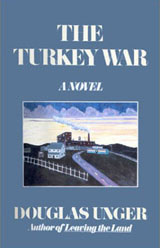
In The Turkey War, Douglas Unger returns to the locale of his distinguished first novel, Leaving the Land. The novel presents the town of Nowell, South Dakota, at the peak of its prosperity and strange destiny, the exciting years of World War II when the Safebuy turkey processing plant was setting records for production with a work force made up mostly of German prisoners of war.
In the American mind, the German soldiers of World War II have existed more or less as highly indoctrinated killers and evil-doers. But there were also German soldiers who resisted or were indifferent to Nazism and were conditioned mainly by the horrors of the war itself. Part of the interest and strength of The Turkey War is that Douglas Unger mainly dramatizes the situation of his German soldiers in Nowell as that of typical immigrants—deprived and resourceful strangers in a bountiful land, and as factory workers of the period—that is, as prisoners less of the U.S. Army than of the profiteering Nowell-Safebuy Corporation.
A tragic story pervaded by irony, The Turkey War centers around the conflict between Mose Johnson, the well-intentioned but driven foreman of the Safebuy plant, and the Hauptmann, the classic type of Prussian officer, who, though badly damaged by his service in the Afrika Korps, controls his fellow prisoners and organizes their work and life with a much stronger hand than does either Johnson or the major in charge of the prison camp. The Hauptmann and his grateful workers quickly increase the plant’s output of frozen and canned turkey for American servicemen. But their improvements produce a vicious spiral of increased quotas that drastically worsen working and safety conditions. Small acts of sabotage occur, and Most Johnson and the Hauptmann are drawn into a struggle of wills that inexorably leads to a violent and fatal resolution.
The Turkey War is a powerful novel: evocative of its hectic time and place in which German orders are given in a prairie accent; subtly organized and charged so its climax comes in a series of devastating explosions; and deeply understood so that it is both a compelling psychological study of a good man driven to evil and an unexpected chapter in the annals of the American labor movement.
—(Jacket copy from first edition)
Praise for The Turkey War:
A compelling novel about a principled, decent man destroyed by his milieu—in this case a turkey processing plant in World War II manned largely by German prisoners of war… Overproduction turns the plant into a vivid Dickensian nightmare, and Johnson, trapped between integrity and acquiescence, takes to drink… The story of Johnson’s failure convincingly dramatizes large issues in a crescendo that leaves him baffled and broken… Mr. Unger has had it both ways: he has written not only a grim study of capitalist profiteering and union-busting during World War II, but also a quasi-naturalistic parable about a good-hearted but very ordinary man finally driven to his knees by circumstances.
—The New York Times Book Review
The novel is excellent… Unger flips the usual P.O.W. story upside down.
—The Los Angeles Times
The Turkey War does for one section of home-front America what The Grapes of Wrath did for the Depression. It makes it achingly familiar.
—The Dallas Morning News
Unfaltering… The Turkey War is more than a good story: It is a documentary of American labor and political corruption, a war history that lives, and because it lives, brings insight.
—Fort Worth Star-Telegram
A taut tale of tragedy mixed with history and small-town life. The Turkey War moves at a brisk pace, packed with charm and reminding us of Steinbeck.
—Inside Books
Unger writes in an active voice that propels his readers into the slaughtering plant and into a piece of forgotten history.
—Argus Leader